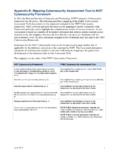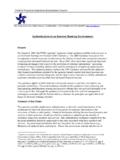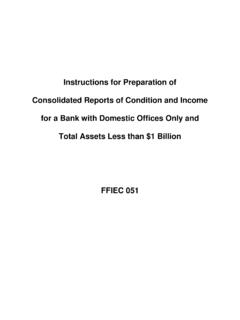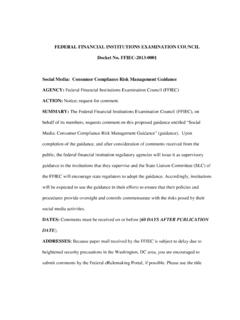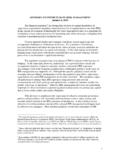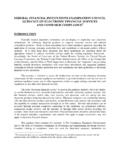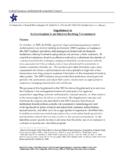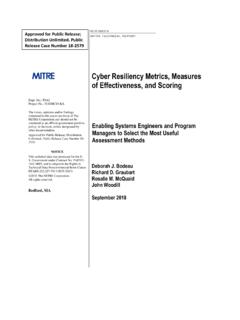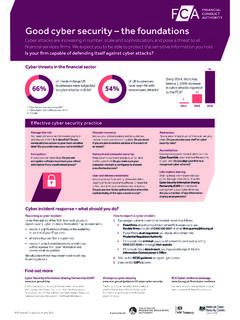Transcription of Appendix J: Strengthening the Resilience of Outsourced …
1 Business Continuity Planning Booklet Appendix J: Strengthening the Resilience of Outsourced Technology Services Background and Purpose Many financial institutions depend on third-party service providers to perform or support critical operations. These financial institutions should recognize that using such providers does not relieve the financial institution of its responsibility to ensure that Outsourced activities are conducted in a safe and sound manner. The responsibility for properly overseeing Outsourced relationships lies with the financial institution's board of directors and senior management. An effective third-party management program should provide the framework for management to identify, measure, monitor, and mitigate the risks associated with outsourcing. 1. When a financial institution relies upon third parties to provide operational services, they also rely on those service providers to have sufficient recovery capabilities for the specific services they perform on behalf of the financial institution.
2 In addition to providing systems and processing, technology service providers (TSPs) may also be retained by a financial institution to provide information technology (IT) recovery capabilities for the financial institution's internal systems. Effective business continuity planning (BCP) and testing demonstrate the financial institution's ability not only to recover IT systems, but also to return critical business functions to normal operations within established recovery time objectives (RTOs). A financial institution should be able to demonstrate the ability to recover critical IT systems and resume normal business operations regardless of whether the process is supported in-house or at a TSP for all types of adverse events ( , natural disaster, infrastructure failure, technology failure, availability of staff, or cyber attack 2).
3 This Appendix discusses four key elements of BCP that a financial institution should address to ensure they are contracting with TSPs that are Strengthening the Resilience of technology services: Third-party management addresses a financial institution management's responsibility to control the business continuity risks associated with its TSPs and their subcontractors. Third-party capacity addresses the potential impact of a significant disruption on a third-party servicer's ability to restore services to multiple clients. 1. FFIEC IT Examination Handbook's Outsourcing Technology Services Booklet, . 2. Refer to Introduction and Business Continuity Planning Process sections of this booklet. FFIEC IT Examination Handbook Page J - 1. Business Continuity Planning Booklet Testing with third-party TSPs addresses the importance of validating business continuity plans with TSPs and considerations for a robust third-party testing program.
4 cyber Resilience covers aspects of BCP unique to disruptions caused by cyber events. Third-Party Management Establishing a well-defined relationship with TSPs is essential to business Resilience . A. financial institution's third-party management program should be risk-focused and provide oversight and controls commensurate with the level of risk presented by the outsourcing arrangement. To ensure business Resilience , the program should include Outsourced activities that are critical to the financial institution's ongoing operations. Attention to due diligence, contract management, and ongoing monitoring of TSPs is important to maintaining business Resilience . The FFIEC IT Examination Handbook's Outsourcing Technology Services Booklet addresses expectations for managing third- party relationships. This section of the Appendix focuses on business-resiliency aspects of third-party management.
5 Due Diligence A financial institution should evaluate and perform thorough due diligence before engaging a TSP. A financial institution should consider the maturity of new technologies and gain an understanding of the benefits and risks of engaging TSPs using such technologies during the due diligence process. Improvements in technologies have the potential to strengthen business Resilience , but may introduce new and different risks ( , shared access to data, virtual exploits, and authentication weaknesses). As part of its due diligence, a financial institution should assess the effectiveness of a TSP's business continuity program, with particular emphasis on recovery capabilities and capacity. 3 In addition, an institution should understand the due diligence process the TSP uses for its subcontractors and service providers.
6 Furthermore, the financial institution should review the TSP's BCP program and its alignment with the financial institution's own program, including an evaluation of the TSP's BCP testing strategy and results to ensure they meet the financial institution's requirements and promote Resilience . Contracts The terms of service should be defined in written contracts 4 that have been reviewed by a financial institution's legal counsel and subject matter experts before execution. Contract 3. See the Third-Party Capacity section below. 4. See the FFIEC IT Examination Handbook's Outsourcing Technology Services Booklet, . for comprehensive information on contract provisions. FFIEC IT Examination Handbook Page J - 2. Business Continuity Planning Booklet terms that can impact the financial institution's ability to ensure effective business Resilience include the following: Right to audit: Agreements should provide for the right of the financial institution or its representatives to audit the TSP and/or to have access to audit reports.
7 A. financial institution should review available audit reports addressing TSPs'. resiliency capabilities and interdependencies ( , subcontractors), BCP testing, and remediation efforts, and assess the impact, if any, on the financial institution's BCP. Establishing and monitoring performance standards: Contracts should define measurable service level agreements (SLAs) for the services being provided. For business continuity expectations, clear recovery time objectives and recovery point objectives (RPOs) should be addressed. Default and termination: Contracts should define events that constitute contractual default ( , the inability to meet BCP provisions, SLAs, and/or RTOs) and provide a list of acceptable remedies and opportunities for curing a default. Subcontracting: If agreements allow for subcontracting, the TSP's contractual provisions should also apply to the subcontractor.
8 Contract provisions should clearly state that the primary TSP has overall accountability for all services that the TSP and its subcontractors provide, including business continuity capabilities. Agreements should define the services that may be subcontracted, the TSP's due diligence process for engaging and monitoring subcontractors, and the notification requirements regarding changes to the TSP's subcontractors. The contractual provisions should also address the right to audit and BCP testing requirements for subcontractors. Additionally, agreements should include the TSP's process for assessing the subcontractor's financial condition. Foreign-based service providers: A financial institution should review data security controls of foreign-based TSPs or foreign-based subcontractors that back up and/or store data offshore. Because information security and data privacy standards may be different in foreign jurisdictions, the contract should clearly address the need for data security and confidentiality to, at a minimum, adhere to regulatory standards.
9 BCP testing: Contracts should address the financial institution's BCP testing requirements 5 for the TSPs. The contract should define testing frequency and the availability of test results. The contract should also include the financial institution's ability to participate in the TSP's BCP testing on a periodic basis. 6. 5. See the Risk Monitoring and Testing section of this booklet. 6. Refer to the Testing With Third-Party TSPs section below. FFIEC IT Examination Handbook Page J - 3. Business Continuity Planning Booklet Data governance: Contracts should clearly define data ownership and handling expectations during the relationship and following the conclusion of the contract. This may include data classification, integrity, availability, transport methods, and backup requirements. In addition, expectations for data volume and growth should be addressed.
10 TSP updates: Contracts should empower a financial institution to request information from its service provider(s) describing the TSP's response to relevant regulations, supervisory guidance, or other notices published by any of the federal banking agencies. Security issues: Contracts should clearly state the responsibility of the TSP to address security issues associated with services and, where appropriate, to communicate the issue(s) and solution(s) to its financial institution clients. Additionally, responsibilities for incident response should be incorporated. The contract should include notification responsibilities for situations where breaches in security result in unauthorized intrusions to the TSP that may materially affect the financial institution clients. Ongoing Monitoring Management should effectively monitor TSP performance throughout the life of the contract.
